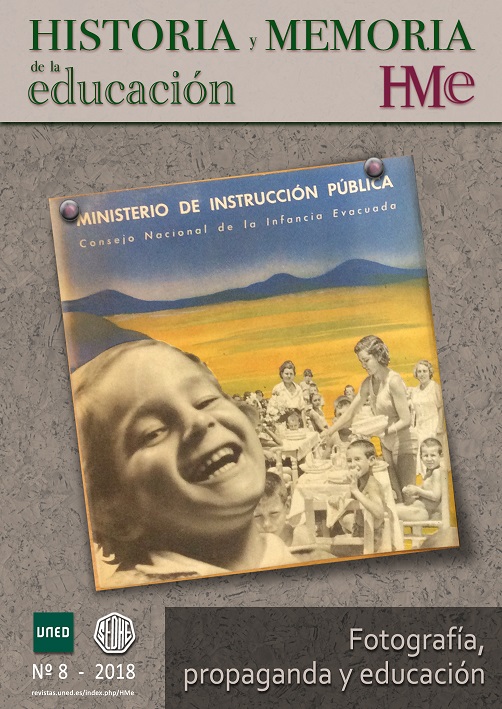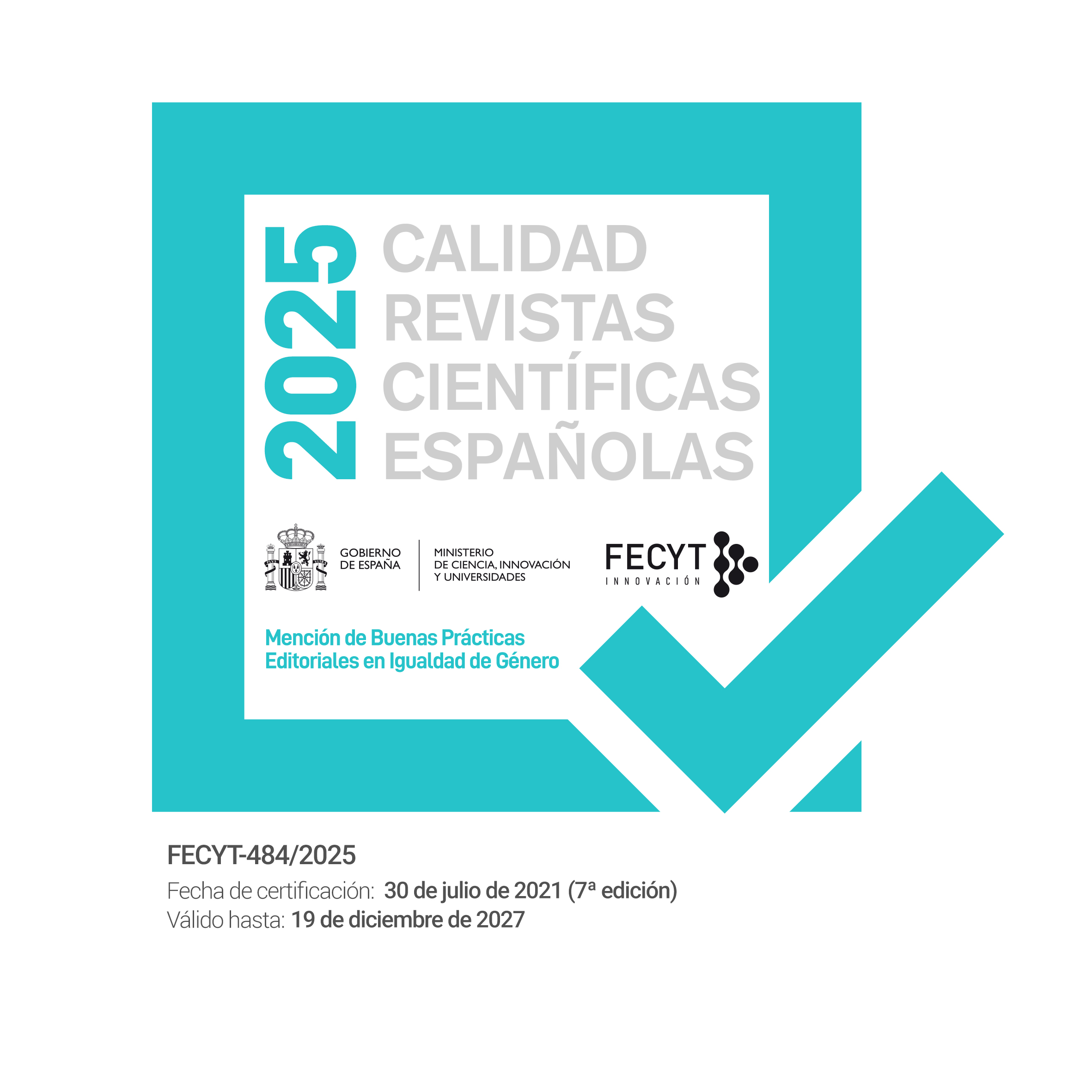Truth in the propagandistic image. Reflections on an enigmatic corpus (Westerbork, 1944)
DOI:
https://doi.org/10.5944/hme.8.2018.20411Keywords:
Image, Truth, Westerbork (1944), Harun Farocki, Respite (2008)Abstract
The article presents a theoretical and historiographical reflection on the links between image and truth, taking as a lens the analysis of the propagandistic image that privileges its political function over others. I will approach this question through some images that were taken as part of a Nazi propaganda film, shot in Westerbork, a work camp in the Netherlands, in 1944. Despite their origin, some of these images have been integrated into the iconography of WWII, and have been used as documents in trials, documentaries and exhibits critical of the Nazis; some others have been invisibilized, perhaps because they are not easily integrated into the frameworks that make the event legible. Along with the reconstruction of the history of this film, I will analyze the re-montage that German filmmaker Harun Farocki (1944-2014) did in his film Aufschub/Respite (2007). Farocki invites to suspend the images to be able to see in them the traces of the human beings that went through the camp; he brings in knowledge and positions that open up other meanings. His methodological approach, which is also ethical and political, deals with the dilemmas of working with and through propaganda images, and can bring valuable reflections and strategies for the historians of educationDownloads
References
Arendt, Hannah. Verdad y política. Barcelona: Página Indómita, 2017.
Barthes, Roland. «Retórica de la imagen (1964)». In Un mensaje sin código. Ensayos completos de Roland Barthes en Communications, 81-101. Buenos Aires: Godot, 2017.
Benning, James. «May 19, 1944 and the Summer of ‘53». En Harun Farocki. Against What? Against Whom?, editado por Antje Ehmann y Kodwo Eshun, 35-37. London: Koenig Books-Raven Row, 2009.
Brecht, Bertolt. ABC de la guerra. Madrid: Ediciones del Caracol, 2004.
Dewey, John. La opinión pública y sus problemas. Madrid: Morata, 2004.
Didi-Huberman, Georges. Imágenes pese a todo. Memoria visual del Holocausto. Barcelona: Gedisa, 2004.
Didi-Huberman, Georges. Cuando las imágenes toman posición. Madrid: Antonio Machado Libros, 2008.
Didi-Huberman, Georges. Remontajes del tiempo padecido. El ojo de la historia 2. Buenos Aires: Editorial Biblos, 2015.
Edwards, Elizabeth. The Camera as Historian. Amateur Photography and Historical Imagination, 1885-1918. Durham, NC: Duke University Press, 2012.
Ehmann, Antje y Kodwo Eshun. «De la A a la Z (O veintiséis introducciones a Harun Farocki)». En Harun Farocki. Desconfiar de las imágenes, editado por Inge Stache, 291-310. Buenos Aires: Caja Negra, 2014.
Elsaesser, Thomas. «Harun Farocki: Filmmaker, Artist, Media Theorist». En Harun Farocki: Working on the Sightlines, editado por Thomas Elsaesser, 11-39. Amsterdam: Amsterdam University Press, 2004.
Elsaesser, Thomas. «Holocaust Memory as the Epistemology of Forgetting? Re-Wind and Postponement in Respite». En Harun Farocki. Against What? Against Whom?, editado por Antje Ehmann y Kodwo Eshun, 57-68. London: Koenig Books-Raven Row, 2009.
Farocki, Harun. «Trailers Biográficos». En Desconfiar de las imágenes, editado por Inge Stache, 233-279. Buenos Aires: Caja Negra, 2014.
Farocki, Harun. «Mostrar a las víctimas». En Desconfiar de las imágenes, editado por Inge Stache, 133-146. Buenos Aires: Caja Negra, 2014.
Farocki, Harun. «Las imágenes deberían testificar contra ellas mismas (2007)». En Harun Farocki. Otro tipo de empatía, editado por Antje Ehmann y Carles Guerra, 86-102. Barcelona: Fundació Antoni Tàpies, 2016.
Fontcuberta, Joan. El beso de Judas. Fotografía y verdad. Barcelona: Gustavo Gili, 1997.
Haan, Ido de. «Vivre sur le seuil: Le camp de Wersterbork dans l’histoire et la mémoire des Pays-Bas. Génocide. Lieux (et non-lieux) de mémoire». Revue d’Histoire de la Shoah 81 (2004): 37-59.
Hillesum, Etty. Diario de Etty Hillesum. Una vida conmocionada. Barcelona: Anthropos, 2007.
Jablonka, Ivan y Annette Wieviorka. Nouvelles perspectives sur la Shoah. Paris: Presses Universitaires de France-La vie des idées, 2013.
Latour, Bruno. «From Realpolitik to Dingpolitik. Or how to make things public». En Making Things Public. Atmospheres of Democracy, editado por Bruno Latour y Peter Weibel, 14-43. Cambridge & London: ZKM/Center for Art and Media Karlsruhe and The MIT Press, 2005.
Lindeperg, Sylvie. Nuit et Brouillard. Un film dans l’histoire. Paris: Odile Jacob, 2007.
Lindeperg, Sylvie «Suspended lives, Revenant Images. On Harun Farocki’s Film Respite». En Harun Farocki. Against What? Against Whom?, editado por Antje Ehmann and Kodwo Eshun, 28-34. London: Koenig Books-Raven Row, 2009.
Lindeperg, Sylvie. La voie des images. Quatre histoires de tournage au printemps-été 1944. Paris: Verdier, 2013.
Lindeperg, Sylvie y Annette Wieviorka. Univers concentrationnaire et génocide. Voir, savoir, comprendre. Paris: Mille et Une Nuits, 2008.
Mirzoeff, Nicholas. The Right to Look. A Counterhistory of Visuality. Durham, NC & London: Duke University Press, 2011.
Mondzain, Marie-José. Image, Icon, Economy. The Byzantine Origins of the Contemporary Imaginary. Palo Alto: Stanford University Press, 2005.
Monmany, Mercedes. Ya sabes que volveré. Tres grandes escritoras en Auschwitz: Irène Némirovsky, Gertrud Kolmar y Etty Hillesum. Barcelona: Galaxia Gutenberg, 2017.
Poovey, Mary. «Why Post-Factuality is So Difficult to Fight». Bildungsgeschichte. International Journal for the Historiography of Education 7, no. 2 (2017): 220-223.
Presser, Jacques. Ashes in the wind. The destruction of Dutch Jewry. London: Souvenir Books, 1968.
Presser, Jacques. The Night of the Girondists. London: Harper Collins, 1992.
Rizvi, Fazal and Gita Steiner-Khamsi. «Negotiating the Post-Fact Era: A Conversation». Bildungsgeschichte. International Journal for the Historiography of Education 7, no. 2 (2017): 229-235.
Simons, Maarten. «Manipulation or Study: Some Hesitations About Post-Truth Politics». Bildungsgeschichte. International Journal for the Historiography of Education 7, no. 2 (2017): 239-244.
Sontag, Susan. Ante el dolor de los demás. Buenos Aires: Alfaguara, 2003.
Downloads
Published
How to Cite
Issue
Section
License
Authors who publish in Historia y Memoria de la Educación agree to the following terms:
- Authors retain copyright and grant the journal right of first publication with the work simultaneously licensed under a Creative Commons Attribution-NonCommercial 4.0 International that allows others to share the work with an acknowledgement of the work's authorship and initial publication in this journal.
- Authors are able to enter into separate, additional contractual arrangements for the non-exclusive distribution of the journal's published version of the work (e.g., post it to an institutional repository or publish it in a book), with an acknowledgement of its initial publication in this journal.
- Authors are permitted and encouraged to post their work online (e.g., in institutional repositories or on their website) prior to and during the submission process, as it can lead to productive exchanges, as well as earlier and greater citation of published work (See The Effect of Open Access).












